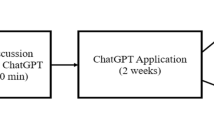Abstract
In this article, we present research in the making of a collective work environment within the framework of a distance education course. We base our theoretical and methodological standpoints on examples of dialogical discourses recorded within the framework of this CSCL system called Symba. In fact, the results of previous research lead us to rethink our vision of the study of collaborative moments between participants in a computer-supported human learning environment that proposes several communication tools. Redefining the methodological process aiming at finding and understanding these rich learning moments is also necessary. We intend to describe “socio-technical” instances during which these collaboration phases appear. More generally speaking, our aim is to draw up both new theoretical and methodological perspectives that would be reusable in CSCL environments; in view of the nature of these two perspectives, and the diversity of the domain knowledge (sociology, cognitivism, linguistics, philosophy, statistics, etc.) brought to bear in the study of the environment in question, our approach constitutes a trans-disciplinary reassessment of the uses of the communication tools—and the study thereof—proposed.







Similar content being viewed by others
Notes
In the CSCL and CSCW literature, it is usual to distinguish the collaborative approach (the different participants involved are working altogether on each issue of the work) and the cooperative approach (division of the work between the different people involved, each of them being in charge of one part of the activity) (Roschelle and Teasley 1995). The “collective” term will be used in this paper to denote a more general term.
Symba is a Web-based framework designed to support collective activities in a learning context.
Collective activity that alternates a Research (individual) phase, a Structuring (individual) phase and a Confrontation (collective) phase.
We state as a working hypothesis that, although the activity theory is a descriptive framework for analysis, the notions it provides can also be used in a more prescriptive way to design computer-based frameworks.
Carried out through interviews and observations.
References
Bardram JE (1997) Plans as situated action: an activity theory approach to workflow systems. Paper presented at European conference on computer supported cooperative work, Lancaster, UK, pp 17–32
Betbeder M-L (2003) Symba : un environnement malléable support d’activités collectives en contexte d’apprentissage. Thèse de doctorat, Le Mans, Université du Maine, France, 2003, 238 pp
Betbeder M-L, Tchounikine P (2003) Symba: a framework to support collective activities in an educational context. In: International conference on computers in education (ICCE 2003), 2–5 décembre 2003, Hong Kong, China, pp 188–196
Betbeder M-L, Tchounikine P (2004) Modélisation et perception de l’activité dans l’environnement Symba . In: Actes de RFIA’04, 28–30 janvier 2004, Toulouse, France, pp 1217–1225
Bourguin G, Derycke A (2001) Integrating the CSCL activities into virtual campuses: foundation of a new infrastructure for distributed collective activities. Paper presented at Euro-CSCL, Maastricht, The Netherlands, pp 123–130
Dillenbourg P, Baker M (1996) Negotiation spaces in human–computer collaborative learning. Paper presented at COOP’96, second international conference on design of cooperative systems, Juan-les-Pins, France, pp 187–206
Dillenbourg P, Baker MJ, Blaye A, O’Malley C (1996) The evolution of research on collaborative learning. In: Reimann DP, Spada H (eds) Learning in humans and machines: towards an interdisciplinary learning science. Pergamon, Oxford, pp 189–211
Engeström Y (1987) Learning by expanding. An activity–theoretical approach to development research. Orienta-konsultit, Helsinki
Jacques F (1979) Dialogiques: recherches logiques sur le dialogue. Presses Universitaires de France, Paris
Jacques F (1985) L’Espace logique de l’interlocution. Presses Universitaires de France, Paris
Jacques F (1990) De “On Denoting” de B. Russell à “On Referring” de P.F. Strawson, l’avenir d’un paradigme, Hermès VII: Bertrand Russell, de la logique à la politique. Editions du CNRS, Paris, pp 91–100
Lewis R (2000) Human activity in learning societies, Invited paper presented at ICCE/ICCAI, Taipei, Taiwan, pp 36–45
Perriault J (1989) La logique de l’usage, Essai sur les machines à communiquer, Flammarion
Roschelle J, Teasley SD (1995). Construction of shared knowledge in collaborative problem solving. In: O’Malley C, Shannon C, Weaver W (eds) Computer-supported collaborative learning. The mathematical theory of communication. University of Illinois Press/Springer, Urbana/Berlin Heidelberg New York
Schmidt CT, Cottier P (2003) Relational issues in improving the management of collective activities in E-learning. In: Proceedings of E-Learn 2003 the 8th world conference on E-Learning in corporate, government, healthcare and higher education, Association for the Advancement of Computing in Education, 7–11 November, Phoenix, Arizona, Etats-Unis, pp 1768–1771
Shannon C, Weaver W (1949) The mathematical theory of communication. University of Illinois Press, Urbana
Suchman L (1987) Plans and situated actions: the problem of human-machine communication. Cambridge University Press, Cambridge
Author information
Authors and Affiliations
Corresponding author
Rights and permissions
About this article
Cite this article
Betbeder, ML., Cottier, P., Schmidt, C. et al. Dialogue in context, towards a referential approach in collective learning. AI & Soc 20, 314–330 (2006). https://doi.org/10.1007/s00146-005-0023-4
Received:
Accepted:
Published:
Issue Date:
DOI: https://doi.org/10.1007/s00146-005-0023-4



